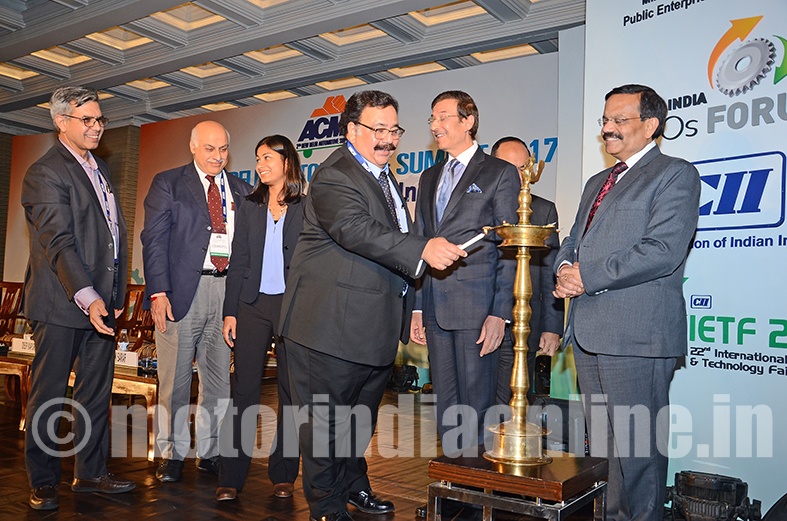The Automotive Component Manufacturers Association (ACMA) organised the 2nd New Delhi Automotive Summit 2017 on February 3-4 with its theme ‘Synergising with Global Supply Chains’.

The summit was graced by Mr. Girish Shankar, Secretary, Ministry of Heavy Industry and Public Enterprise, as the Chief Guest, Mr. Vivek Chaand Sehgal, Chairman, Samvardhana Motherson Group & Motherson Sumi Systems Ltd., Mr. Deep Kapuria, Chairman, the Hi-Tech Group, and Mr. Rattan Kapur and Mr. Nirmal K. Minda, ACMA President and Vice President respectively. Ms. Priyam Saraf, Economist – Young Professional, Trade & Competitiveness World Bank Group, presented results of a recent World Bank Study on the Indian auto component industry’s competitiveness in global value chain and the imperatives for the industry to stay competitive in tune with the dynamism of the global automotive value chain.
Speaking on the occasion, Mr. Girish Shankar observed: “All reforms and policies introduced by the Government in the recent past are aimed at making the industry more competitive. The Government is constantly focusing on enhancing the ease of doing business with GST being one of the biggest initiatives that will streamline the prevailing indirect tax structure. It is crucial for the domestic automotive industry to synergise with the global supply chain and focus on R&D and Innovation. With the successful establishment of crash-test facility at NATRIP, we are set to achieve higher standards in vehicle safety. With fund sanction for the second phase of FAME scheme in the recent Union Budget we are facilitating significant traction for electric mobility in the country.”
Mr. Vivek Chaand Sehgal said: “Keeping pace with the changing face of mobility in India and the world, faster adoption of new technologies has made us a globally preferred solutions provider in the industry. Some factors which have differentiated us from others are a clear non-monetary vision of working in synergy with our customers, treating employees and shareholders as strategic partners, building a future roadmap through five-year performance projection with focus on three growth pillars, i.e., organic growth, joint ventures & alliances and inorganic growth through acquisitions. Further, there is a need to move from products to solutions considering the parameters of quality, cost, delivery, design, management, safety, environment, and sustainability.”
Mr. Rattan Kapur said: “The last few years have witnessed a systematic shift as the Indian auto component manufacturers are making a conscious effort to move away from ‘Build to Print’ to innovation, R&D, and creation of products and IP, with Quality as the bedrock. Technology has the capacity to bring about disruptive changes as we are witnessing today with the fast adoption of hybrid vehicles, electric vehicles, and autonomous vehicles. Our exports have grown at a CAGR of 18% over the last six years to 160 countries with the presence of 40 IPOs, which is a matter of great achievement for us. Furthermore, the Union Budget gives adequate focus to the development of the rural and social sectors, as well as to the industry and infrastructure. The emphasis on strengthening the rural economy will lead to positive impact on demand for vehicles and farm equipment. Moreover, with the reduction in the corporate tax, MSMEs will get the much-needed relief and encouragement.”
The 2nd New Delhi Automotive Summit 2017 concluded with the various action points, which will bring new synergies in the global supply chains industry for the overall growth of the auto components sector in India. Automotive companies, both Indian and international, OEMs or component suppliers alike, have made their presence felt on the global stage. In addition, the conference involved discussions on Creating Global Value with Supply Chains and How Disruptive Technologies are shaping Value Chains of the Future. The event also outlined the current state of the industry and indicated the way forward as well as the opportunities that could exist for suppliers in the near future.